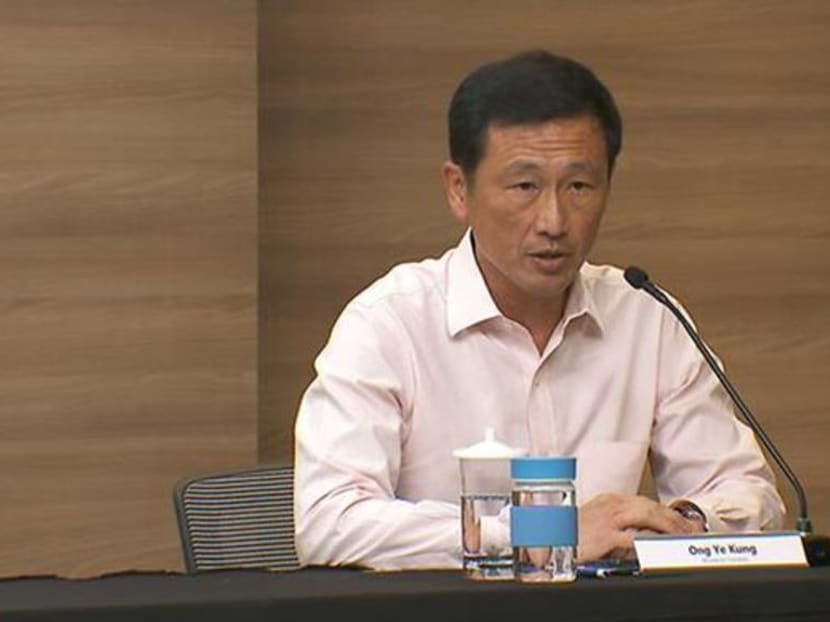All children with Covid-19 so far had ‘mild symptoms’, untrue B1617 variant ‘attacks children especially’: Ong Ye Kung
SINGAPORE ꟷ So far, all the children infected with Covid-19 have had mild symptoms. It is also not true that the new B1617 variant of the virus “attacks children especially”, said Health Minister Ong Ye Kung on Thursday (May 27).

Health Minister Ong Ye Kung (pictured) put up a Facebook post on May 27, 2021, to deal with questions about the Covid-19 vaccine programme.
- Health Minister Ong Ye Kung said that so far, all children infected with Covid-19 have had mild symptoms
- He said it is not true that the new B1617 variant “attacks children especially”
- He was responding to common questions on the Covid-19 pandemic in a Facebook post
- Allaying concerns, Mr Ong also said that the Pfizer-BioNTech works well for those aged 12 to 15
SINGAPORE — So far, all the children infected with Covid-19 have had mild symptoms. It is also not true that the new B1617 variant of the virus “attacks children especially”, Health Minister Ong Ye Kung said on Thursday (May 27).
“There is no evidence that the new variant attacks children more than adults. But the new strain appears to be more transmissible, affecting both children and adults,” Mr Ong wrote in his second Facebook post this week addressing common questions on the pandemic.
His comments came a little over a week after he had said that the new strain “appears to affect children more’’.
Mr Ong, who is co-chair of the government task force for Covid-19, made the comment at the time to explain why schools quickly shifted to home-based learning and tested all their students for Covid-19 once an infection is detected in a student.
The B1617 strain, commonly known as the double-mutant variant of the coronavirus, was first detected in India last year.
PFIZER-BIONTECH VACCINE WORKS 'JUST AS WELL' FOR YOUNG
In his post, Mr Ong also debunked opinions that the Pfizer-BioNTech vaccine is not suitable for children as it is based on a new messenger ribonucleic acid (mRNA) technology, rather than an old “killed virus” vaccine.
The Pfizer-BioNTech vaccine was approved to be safe for use for children aged between 12 and 15 by the authorities last week.
The vaccine makes use of mRNA that enables the vaccine recipient's body to build a protein component, known as the spike protein, of the Sars-Cov-2 virus that causes Covid-19.
“Killed virus” vaccine, on the other hand, uses a weakened or inactivated virus in the vaccine that is modified so that it no longer causes illness.
Mr Ong said: “We are aware of various opinions on this matter among the public but the Ministry of Health needs to go by the scientific evidence presented by rigorous clinical trials.
“Pfizer-BioNTech has done so and results showed that the vaccine works just as well for young people aged 12 to 15 years old, and the United States and Canada have approved its use for this group.”
Last week, an expert committee on the Covid-19 vaccine in Singapore had countered concerns expressed by a group of doctors here that the vaccine is not safe for children as it could possibly alter a person’s deoxyribonucleic acid (DNA).
In an open letter to parents considering inoculating their children against Covid-19, the group of doctors cited a study suggesting that the ribonucleic acid (RNA) from Sars-Cov-2 can be converted into DNA using an enzyme called reverse transcriptase, which the doctors said is “very troubling”.
The doctors had also called for a "killed-virus vaccine" to be approved for use here. All but one of the doctors later retracted the statement.
In his post, Mr Ong said that there is currently no “killed-virus” Covid-19 vaccine approved for use in children.
“There is also a view that since the younger group tend to have milder symptoms, the risks of vaccination for adolescents and children outweigh the benefits.
“But vaccination remains important for this group as young people who are infected may be transmitting the virus to the older family members at home. So please consider that, too,” he said.











